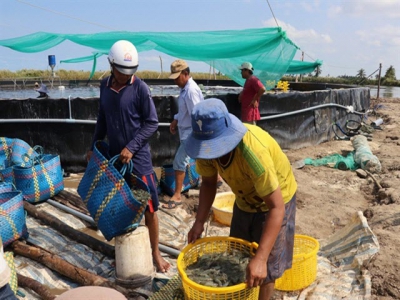Kiên Giang to expand industrial shrimp farming

KIÊN GIANG — The Cửu Long (Mekong) Delta province of Kiên Giang plans to increase the area under industrial and semi-industrial shrimp farming models to 3,200ha and annual output to 28,000 tonnes this year, according to its Department of Agriculture and Rural Development.
Harvesting white-legged shrimp bred using the two-stage industrial farming model in Kiên Giang Province’s An Minh District. — VNA/VNS Photo Lê Huy Hải
Quảng Trọng Thao, deputy director of the department, said to ensure safe, sustainable and efficient shrimp farming, the province would carefully monitor the farming environment and outbreak of diseases to promptly address problems.
The province is carrying out a plan to proactively monitor for diseases in shrimp farming areas in Kiên Lương District’s Bình Trị Commune, a major industrial shrimp farming area in the province, and will later create a shrimp farming area free of white spot, yellow head and taura diseases in the commune.
The province, one of the delta’s largest shrimp producers, is setting up 44 sites to demonstrate the industrial and semi-industrial shrimp farming models. Farmers can visit them to learn how to practice the models.
The province will also teach farmers shrimp farming techniques that use advanced technologies and water efficiently and Vietnamese good agricultural practices (VietGAP) standards, according to the department.
It will act as a link for shrimp farmers to tie up with companies to ensure they can sell their output and invest in infrastructure required for industrial and semi-industrial shrimp farming.
It will instal a three-phase power supply system in Kiên Lương, An Biên and An Minh districts to meet the requirements of industrial and semi-industrial shrimp farmers.
Hà Tiên City will dredge irrigation canals to ensure there is adequate water supply for aquaculture.
Harvest going on
Farmers in the province have so far harvested 700ha of industrial and semi-industrial shrimp this year, producing 3,632 tonnes.
Last year they had produced more than 24,800 tonnes on 2,850ha, including more than 950ha under the two-stage industrial farming model.
Under the model, juvenile shrimp are raised in a nursery pond for a few weeks in the first phase and then transferred to a main pond for breeding.
The pond beds are covered with plastic sheets and nets are hung above to keep out sunlight. Ponds are also equipped with oxygenation facilities.
This model provides high incomes for farmers and processors and protects the environment since wastewater is treated before being released into the environment.
In Hòn Đất District’s Thổ Sơn Commune, many farmers have successfully adopted it.
Mai Văn Nhường of Thổ Sơn’s Hòn Quéo Hamlet was one of first, having tried it during the last shrimp crop.
He earned more than VNĐ200 million ($8,600) from farming shrimp in a 2,000sq.m pond, he said.
The model is efficient since the shrimp contract few diseases and require less tending than in traditional models, he said.
“Thanks to modern facilities, farmers can easily manage the environment.”
Võ Thanh Bình of the Thổ Sơn Commune Economy - Agricultural Technique Division said traditional methods require a lot of time and labour to renovate ponds after each crop.
Farmers cannot manage food residues and other waste in their shrimp ponds and the animals are easily affected by diseases whereas under the two-stage industrial shrimp farming model they can actively manage these problems and improve the shrimp survival rate, he added.
Có thể bạn quan tâm
 Shrimp exporters in Mekong Delta face challenges amid Covid-19 epidemic
Shrimp exporters in Mekong Delta face challenges amid Covid-19 epidemic Shrimp is a key export item of many provinces in the Cửu Long (Mekong) River Delta, but the Covid-19 epidemic has caused challenges for exporters.
 Aquaculture Frontiers, part 2: Who will disrupt the salmon industry?
Aquaculture Frontiers, part 2: Who will disrupt the salmon industry? In this second instalment, Craze focuses on the salmon farming sector, and how it is tackling some of its biggest challenges.
 Pangasius farmers in Mekong Delta provinces suffer double losses
Pangasius farmers in Mekong Delta provinces suffer double losses In the past days, many pangasius-farming households and export enterprises have fallen into a difficult situation as the price of pangasius fish dropped steeply